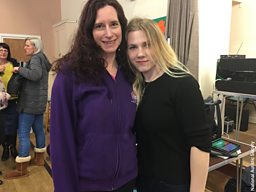'A boiling feeling that builds up inside'
Saskia Lupin is an actor. She is also autistic.
In a special report for BBC Radio 5 live, Saskia investigates what goes through an autistic person’s mind when things don’t go to plan, and finds out what other people could do to help.

I can have panic attacks when things don’t turn out the way I’d hoped. I become very agitated.
It’s hard to explain the sensation but it can feel like I’m about to explode.
Just imagine a boiling feeling that builds up inside you until you just feel totally exhausted by your brain trying to process everything… and then something unexpected happens, boom! That’s a trigger and it takes me by surprise.
It leaves me scared. What do I do next?
Autism is a bit misunderstood. There’s not enough awareness about it.
So often when I’m going through this, people just stare – it can make you feel so small.

But I’m not alone. The National Autistic Society says that more than one in 100 people are on the autism spectrum, that’s around 700,000 people in the UK.
Sometimes the fear is so big it can make leaving the house impossible."
When you’re autistic, the world can feel really intense. Social situations can be tricky to navigate and sometimes a kind of sensory overload kicks in which leaves you completely overwhelmed, especially in busy places.
Take transport: crowded trains, delays and diversions can bring on stress in a way that might be hard for others to imagine.
Sometimes the fear is so big it can make leaving the house impossible.
More than half of those with the condition say fear of unexpected changes has stopped them from going on a bus or train.
I made a video with the National Autistic Society to highlight these issues. In it, I become increasingly more anxious and distressed and feel trapped and stared at by other passengers.
For BBC Radio 5 live, I headed to my home town, Brighton, and showed the video to passengers Kelly, James and Jordan on the train station platform.
I asked if they’d know what to do if they saw someone in that situation.

Jordan thought it could be difficult.
“Sometimes autism isn’t a visible condition," he said, "but obviously if I was aware, I would ask the person if they’re alright and let them know it’s cool, that I’ve got them.”
Kelly said, “it’s that line between judging and then not knowing what to do...it could be as simple as just showing a glance of, ‘hey, are you okay?'”

My next stop was Bexhill’s National Autistic Society branch where they were holding an Easter event. I wanted to learn more about other people’s experiences of dealing with the unexpected.
Sat between the stands and activities buzzing around us, I spoke to 12-year-old Alex who has Asperger's syndrome.
He told me he has quite a lot of anxiety and one Boxing Day it all became too much.
“I saw a tablet on display and I went to buy it with my Christmas money and they said they didn’t have it in stock," he said.
"I was really annoyed so I ran over to the corner of the shop where the washing machines were and I just had to sit down on the floor for a bit and calm down.”

Alex also opened up to me about what he called his 'red mist' - when he loses awareness of what he's doing:
The sad thing is that the public don’t always know how to react."
“You only realise afterwards when people tell you what you’ve done, you feel really embarrassed about it.”
The sad thing is that the public don’t always know how to react. Alex’s sister said that people will stop and stare at him.
Thankfully these siblings look out for each other when episodes like this happen.
I also spoke to Sarah, whose 14-year-old son and 12-year-old daughter are both autistic and have very complex needs.
She said her son doesn’t speak very clearly and often does what’s known as ‘stimming’.
This is a repetitive isolated behaviour which autistic people commonly do when they’re feeling anxious.
It’s a way to make ourselves feel calmer. This could be actions such as rocking backwards and forwards or flapping our hands.
However, many autistic people say they’ve had people staring, tutting, making comments or rolling their eyes at them when they do this.

So what can the public do to help?
Mum Sarah had some simple advice, “just smile or give them the space they need…rather than that stare glare you often get, the judging face."
I could completely empathise with Alex and Sarah – and even members of the public who don’t know how to react. But it’s time to get clued up and raise awareness about autism.
Looking at me, you might not be able to tell I’m autistic, but what’s going on inside can be an overwhelming well of confusion.
We might not experience the world in the same way everyone else does, but smiling rather than staring would be a good first step to understanding.

Living with autism: How do you cope with unexpected change?
Actor Saskia Lupin explores how people with autism deal with unexpected change.




